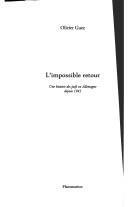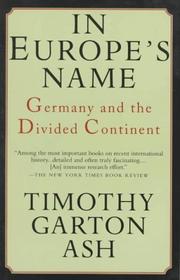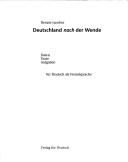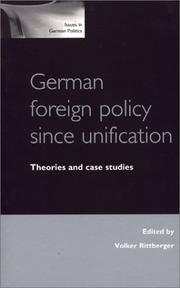| Listing 1 - 9 of 9 |
Sort by
|
Book
ISBN: 2738104002 9782738104007 Year: 1996 Publisher: Paris: Odile Jacob,
Abstract | Keywords | Export | Availability | Bookmark
 Loading...
Loading...Choose an application
- Reference Manager
- EndNote
- RefWorks (Direct export to RefWorks)
L'auteur propose une visite des lieux de mémoire dans cette ville de Berlin qui attend toujours l'arrivée du gouvernement qui manifestera qu'elle est à nouveau la capitale du pays réunifié. Ce livre est un lieu de réflexion sur l'histoire de l'Allemagne de Weimar à la RDA en passant par le IIIème Reich.
Berlin (Germany) --- Berlin (Allemagne) --- History --- Social conditions. --- Histoire --- Conditions sociales --- Nazisme --- 20e siècle --- Allemagne --- Berlin --- Social conditions --- Berlin (Germany) - History - 1990 --- -Berlin (Germany) - Social conditions

ISBN: 9782082105545 2082105547 Year: 2007 Publisher: Paris: Flammarion,
Abstract | Keywords | Export | Availability | Bookmark
 Loading...
Loading...Choose an application
- Reference Manager
- EndNote
- RefWorks (Direct export to RefWorks)
Jews --- Juifs --- History --- Histoire --- Germany --- Allemagne --- Ethnic relations --- History. --- Relations interethniques --- German Jews --- After World War 2 --- 20th Century --- Jews - Germany - History - 1945-1990 --- Jews - Germany - History - 1990 --- -Germany - Ethnic relations
Book
ISBN: 3190074151 9783190074150 Year: 2001 Publisher: München: Hueber,
Abstract | Keywords | Export | Availability | Bookmark
 Loading...
Loading...Choose an application
- Reference Manager
- EndNote
- RefWorks (Direct export to RefWorks)
German language --- Textbooks for foreign speakers --- Study and teaching --- Readers --- Germany --- Civilization --- History --- Duits --- leermiddelen --- leermiddelen. --- Leermiddelen. --- German language - Textbooks for foreign speakers --- German language - Study and teaching - Readers --- Germany - Civilization --- Germany - History - 1990 --- -Duits

ISBN: 0679755578 9780679755579 Year: 1994 Publisher: New York: Vintage books,
Abstract | Keywords | Export | Availability | Bookmark
 Loading...
Loading...Choose an application
- Reference Manager
- EndNote
- RefWorks (Direct export to RefWorks)
German reunification question (1949-1990) --- Allemagne, Question de la réunification de l' (1949-1990) --- Allemagne, Question de la réunification de l' (1949-1990) --- Germany --- Europe --- History --- Politics and government --- Relations --- Allemagne --- Politique et gouvernement --- Histoire --- Germany - History - 1990 --- -Germany - Politics and government - 1945-1990 --- Germany - Relations - Europe --- Europe - Relations - Germany --- Europe - Politics and government - 1989 --- -German reunification question (1949-1990)
Book
ISBN: 9782234053359 2234053358 Year: 2001 Publisher: Paris: Stock,
Abstract | Keywords | Export | Availability | Bookmark
 Loading...
Loading...Choose an application
- Reference Manager
- EndNote
- RefWorks (Direct export to RefWorks)
L'auteur nous propose une analyse originale des avatars de la mémoire et de l'oubli aujourd'hui.
Sociology of culture --- Berlin --- Architecture --- Histoire --- Histoire de l'architecture --- Nazisme --- Politique --- Politique et art --- National socialism - Psychological aspects --- Communism - Germany - Berlin --- Allemagne --- Berlin (Germany) - History - 1990 --- -Berlin (Germany) - Buildings, structures, etc --- Berlin (Germany) --- Berlin (Allemagne) --- History --- Buildings, structures, etc. --- Social conditions. --- Constructions --- Conditions sociales --- National socialism --- Communism
Book
ISBN: 9783034305556 3034305559 Year: 2010 Volume: 15 Publisher: Bruxelles: Lang,
Abstract | Keywords | Export | Availability | Bookmark
 Loading...
Loading...Choose an application
- Reference Manager
- EndNote
- RefWorks (Direct export to RefWorks)
Vingt ans après, l’unification allemande du 3 octobre 1990 est devenue un événement historique et politique majeur de la fin du 20ème siècle. En même temps, la perception et l’interprétation de l’événement, de ses conséquences et de sa portée demeurent toujours partiellement politisées. Ils suscitent des débats controversés qui se déroulent aujourd’hui dans un contexte particulier : l’Allemagne reste marquée, en dépit d’un processus de convergence et d’homogénéisation évident entre les deux parties unifiées, par des différences considérables entre l’Est et l’Ouest, tant pour les aspects socio-économiques que pour le paysage politique ou la perception du passé.Dans cet ouvrage, qui contient dix contributions en français ainsi que deux en allemand, des spécialistes français et allemands proposent des analyses historiques sur les aspects politiques, juridiques, économiques et internationaux du processus de l’Unification. En même temps, le livre aborde les enjeux mémoriels et identitaires ainsi que les usages politiques actuels de ce passé, qui jouent un rôle clé dans la culture démocratique de la « République de Berlin ». Ainsi est mise en évidence la complexité des questions liées à l’Unification ; à l’heure des commémorations, l’ouvrage propose un regard critique sur ce bouleversement historique et ses interprétations.
Collective memory --- Mémoire collective --- Germany --- Allemagne --- History --- Histoire --- DE / Germany - Duitsland - Allemagne --- DD / Eastern Germany - Ddr - Rda --- 92 --- 341.213 --- 321.1 --- Geschiedenis. --- Statenbond. Federatie en confederatie. Dominions. Kolonies. --- Theorie, ontstaan en evolutie van de staat. --- Histoire. --- History. --- 92 Geschiedenis. --- 92 Histoire. --- 92 History. --- Mémoire collective --- Theorie, ontstaan en evolutie van de staat --- Statenbond. Federatie en confederatie. Dominions. Kolonies --- Geschiedenis --- Collective memory - Germany --- Germany - History - Unification, 1990 --- Germany - History - 1990 --- -Collective memory --- Historiographie --- 1990-.... --- Aspect politique --- 1989-1990 (Unification)
Book
ISBN: 3030048047 3030048039 9783030048037 Year: 2019 Publisher: Cham : Springer International Publishing : Imprint: Palgrave Macmillan,
Abstract | Keywords | Export | Availability | Bookmark
 Loading...
Loading...Choose an application
- Reference Manager
- EndNote
- RefWorks (Direct export to RefWorks)
The post-war Federal Republic of Germany faced the task of addressing the plight of the victims of state socialism under the Soviet occupation of eastern Germany and in the German Democratic Republic, many of whom fled to the west. These victims were not passive objects of the West German state’s policy, but organized themselves into associations that fought for recognition of their contribution to the fight against communism. After German unification, the task of commemorating and compensating these victims continued under entirely new political circumstances, yet also in the context of global trends in memory politics and transitional justice that give priority to addressing the fate of victims of non-democratic regimes. Constructions of Victimhood: Remembering the Victims of State Socialism in Germany draws on the constructivist systems theory of Niklas Luhmann to analyze the role of victims organizations, the political system, and historians and heritage professionals in the struggle over the memory of suffering under state socialism, from the Cold War to the present day. The book argues that the identity and social role of victims has undergone a process of constant renegotiation in this period, offering an innovative theoretical framework for understanding how restorative measures are formulated to address the situation of victims. As such, it offers not only insights into a neglected aspect of post-war German history, but also contributes to the ongoing academic debate about the role of victims in process of transitional justice and the politics of memory.
Cultural heritage. --- Ethnology-Europe. --- Historiography. --- War Crimes. --- Europe-Politics and government. --- Cultural Heritage. --- European Culture. --- Memory Studies. --- European Politics. --- Crime --- Historical criticism --- History --- Authorship --- Cultural heritage --- Cultural patrimony --- Cultural resources --- Heritage property --- National heritage --- National patrimony --- National treasure --- Patrimony, Cultural --- Treasure, National --- Property --- World Heritage areas --- Criticism --- Historiography --- Ethnology—Europe. --- Europe—Politics and government. --- Transitional justice - Germany --- Collective memory - Germany --- Germany - History - 1990 --- -Germany - Politics and government - 1990 --- -Cultural heritage. --- Transitional justice --- Collective memory --- Germany

ISBN: 3885326884 9783885326885 Year: 1994 Publisher: München: Verlag für Deutsch,
Abstract | Keywords | Export | Availability | Bookmark
 Loading...
Loading...Choose an application
- Reference Manager
- EndNote
- RefWorks (Direct export to RefWorks)
Didactics of German --- Duitsland --- Duitse woordenschat --- Readers --- -German language --- -914.30 --- 81'3 --- -Readers --- Duitsland - algemeen --- Duits als vreemde taal --- Readers. --- landkunde --- sociaal-economische studies --- Duits als vreemde taal. --- cultuur. --- handboeken. --- landkunde. --- samenleving. --- sociaal-economische studies. --- Cultuur. --- Handboeken. --- Landkunde. --- Samenleving. --- Sociaal-economische studies. --- German language --- Textbooks for foreign speakers --- Study and teaching --- Germany --- Civilization --- History --- Textbooks for foreign speakers. --- Geschiedenis. --- geschiedenis --- 914.30 --- Ashkenazic German language --- Hochdeutsch --- Judaeo-German language (German) --- Judendeutsch language --- Judeo-German language (German) --- Jüdisch-Deutsch language --- Jüdischdeutsch language --- Germanic languages --- Study and teaching&delete& --- Civilization. --- Ausländer. --- Deutschunterricht. --- German language. --- Landeskunde. --- Lehrmittel. --- Study and teaching. --- Since 1990. --- Allemagne --- Allemand (langue) --- Germany. --- Civilisation. --- Histoire. --- German language - Textbooks for foreign speakers --- German language - Study and teaching - Readers --- Germany - Civilization --- Germany - History - 1990

ISBN: 0719060397 0719060400 9780719060397 9780719060403 Year: 2001 Publisher: Manchester: Manchester University press,
Abstract | Keywords | Export | Availability | Bookmark
 Loading...
Loading...Choose an application
- Reference Manager
- EndNote
- RefWorks (Direct export to RefWorks)
This work examines the extent to which German foreign policy has changed since unification, and analyses the fundamental reasons behind this change
International relations. Foreign policy --- anno 1990-1999 --- Germany --- European Union countries --- Allemagne --- Pays de l'Union européenne --- Foreign relations --- History --- Relations extérieures --- Histoire --- #SBIB:327H12 --- #SBIB:328H213 --- #SBIB:033.AANKOOP --- #SBIB:REFCOLL2003 --- 820 Internationale betrekkingen --- 884.4 West-Europa --- Buitenlandse politiek: Westeuropese landen --- Instellingen en beleid: Bondsrepubliek Duitsland --- -Germany --- EU countries --- Euroland --- Europe --- -Foreign relations administration. --- Foreign economic relations --- -Foreign economic relations --- -History --- -#SBIB:327H12 --- -International relations. Foreign policy --- Pays de l'Union européenne --- Relations extérieures --- Weimar Republic --- Germanii︠a︡ --- Германия --- BRD --- FRN --- Jirmānīya --- جرمانيا --- Nimechchyna --- Gjermani --- Federalʹna Respublika Nimechchyny --- Veĭmarskai︠a︡ Respublika --- Ashkenaz --- Germanyah --- Bundesrepublik Deutschland --- Federal Republic of Germany --- Deutschland --- Repoblika Federalin'i Alemana --- República Federal de Alemania --- Alemania --- República de Alemania --- Bu̇gd Naĭramdakh German Uls --- Kholboony Bu̇gd Naĭramdakh German Uls --- KhBNGU --- ХБНГУ --- German Uls --- Germania --- Republika Federal Alemmana --- Deutsches Reich --- Grossdeutsches Reich --- Weimarer Republik --- Vācijā --- Germany (Territory under Allied occupation, 1945-1955) --- Germany (Territory under Allied occupation, 1945-1955 : British Zone) --- Germany (Territory under Allied occupation, 1945-1955 : French Zone) --- Germany (Territory under Allied occupation, 1945-1955 : Russian Zone) --- Germany (Territory under Allied occupation, 1945-1955 : U.S. Zone) --- Germany (East) --- Germany (West) --- Holy Roman Empire --- Foreign relations administration --- ドイツ --- Doitsu --- ドイツ連邦共和国 --- Doitsu Renpō Kyōwakoku --- ドイツ レンポウ キョウワコク --- Deguo --- 德国 --- Gėrman --- Герман Улс --- Germany - Foreign relations - 1990- - Case studies --- Germany - Foreign relations administration - Case studies --- Germany - Foreign economic relations - European Union countries - Case studies --- European Union countries - Foreign economic relations - Germany - Case studies --- Germany - History - 1990 --- -#SBIB:033.AANKOOP
| Listing 1 - 9 of 9 |
Sort by
|

 Search
Search Feedback
Feedback About UniCat
About UniCat  Help
Help News
News